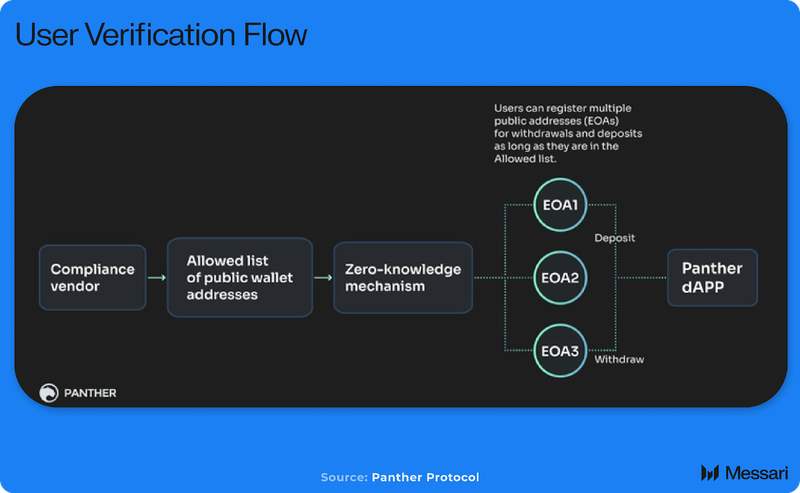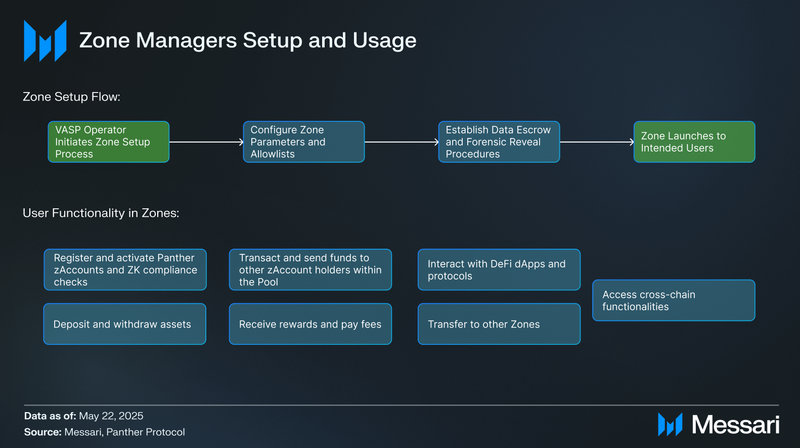and the distribution of digital products.
DM Television
Panther Protocol: Advancing Privacy-Preserving DeFi
- Panther Protocol launched its Limited Mainnet Beta on Polygon, integrating Eurobit (Zone Manager) and PureFi (compliance provider), with 5 million ZKP tokens in incentives. This controlled rollout tests Panther’s privacy tech in real conditions while ensuring regulatory compliance.
- A 171-day audit by Veridise tested the security of Panther’s smart contracts and Zero-Knowledge circuits, boosting user and market trust in its privacy infrastructure. This independent verification establishes trust for both users and market operators by confirming that Panther's privacy-preserving architecture functions as designed without compromising security.
- Panther open-sourced its code (LGPL3.0/MIT) and transferred IP to the Panther Foundation, aligning with Web3 values and encouraging developer and ecosystem participation. This move invites developers, financial market participants, and blockchain innovators to integrate, utilize, and build upon Panther's privacy-enhancing technology, accelerating ecosystem growth while reinforcing the protocol's commitment to decentralization.
Panther Protocol (ZKP), founded in 2021, is a zero-knowledge cross-protocol layer unlocking compliant DeFi. Panther aims to create a fully decentralized, multichain, privacy-enhanced protocol that allows VASP-licensed entities to create customizable trading environments. Through the use of UTXOs, liquidity partitioned Zones run by Zone Managers, Shielded Pools, Compliance Tools, and DeFi Adaptors; Panther is well on the way to providing a privacy-preserving framework with onchain access. The project is currently on its 9th stage of testing (Limited Mainnet Beta), which went live on March 31, 2025.
Panther Protocol was co-founded by Oliver Gale and Dr. Anish Mohammed. Oliver Gale joined the crypto space in 2013, launched one of the first CBDC pilots in the Caribbean, and participated in policy discussions on the world stage with the UN, IMF, and many central banks. Dr. Anish Mohammed has spent over two decades in the security and cryptography space with an emphasis on researching cryptographic algorithms. Dr. Mohammed was also an early advisor to Ripple and Ocean Protocol, as well as a part of the Ethereum Swarm (Orange) team, where he reviewed the Orange paper.
Since its inception, Panther has raised $31.8 million across three private funding rounds and one public token sale.
Website / X (Twitter) / Discord / Docs
Limited Mainnet BetaThe Panther Protocol Foundation launched its Limited Mainnet Beta (Canary) on Polygon in March 2025, marking a significant milestone in its journey toward private, compliant DeFi. Unlike previous testnet stages, this beta operates with real assets in a controlled environment, allowing Panther to validate its privacy technology under actual market conditions.
Beta Structure and FeaturesThe beta features a single-Zone implementation managed by Eurobit, a licensed Virtual Asset Service Provider (VASP) acting as Zone Manager. PureFi serves as the compliance provider, handling KYC and KYT processes, including wallet screening. Together, they demonstrate Panther's ability to integrate with licensed financial entities while maintaining privacy.

Key features being tested include:
- Privacy-Preserving Transactions: Users can deposit whitelisted assets into Shielded Pools and conduct private transactions using Zero-Knowledge Proofs.
- zSwap Integration: Connected to Uniswap V3 and QuickSwap on Polygon, users can execute private asset swaps with established DeFi protocols.
- Compliance Framework: Users undergo KYC to create zAccounts, while Data Escrow enables regulatory oversight when necessary.
- Gas Fee Innovation: The payment of gas fees using ZKP tokens directly from zAccount balances is being tested.

The beta supports up to 10 whitelisted tokens (e.g., ZKP, POL, LINK, GRT, UNI, QUICK, AAVE) with daily transaction caps of $100.
To encourage participation, Panther allocated 4 million ZKP for rewards and 1 million ZKP to subsidize network costs (0.5% of the total token supply). The beta leverages community-run miners for transaction processing and Merkle Tree updates, reinforcing Panther's decentralized vision. 2,900+ zAccounts have participated in the Canary network.
Significance for Panther's RoadmapThis beta represents a critical validation point for Panther's approach to privacy-preserving DeFi for several key reasons:
- Real-World Validation: It demonstrates Panther's ability to deliver privacy while maintaining compliance, a combination that has proven challenging for many blockchain projects. The approach of working with licensed VASPs represents a novel path to reconciling these competing priorities.
- Ecosystem Integration: By connecting with Uniswap and QuickSwap, Panther shows how privacy can extend to existing DeFi infrastructure rather than replacing it, addressing the isolation problem that has limited other privacy solutions.
- Regulatory Framework Testing: The model of VASP-managed Zones with comprehensive compliance measures could establish a blueprint for how privacy and compliance can coexist in DeFi.
In April 2025, Panther Protocol announced a comprehensive security audit conducted by blockchain security firm Veridise. This independent verification of the protocol's security and privacy mechanisms represents a crucial step toward mainnet launch.
Audit Scope and ProcessThe Veridise audit was conducted over 171 days, a substantial investment reflecting the complexity of Panther's privacy architecture. The audit covered five critical areas:
- Smart Contract Security: Verification that the contracts function without vulnerabilities that could lead to loss of funds or privacy breaches.
- Zero-Knowledge Circuits: Validation of the ZK-Proof systems that form the foundation of Panther's privacy solution.
- Compliance Mechanisms: Assessment of selective disclosure schemes and tools that enable regulatory oversight while preserving privacy.
- Protocol-Wide Vectors: Examination of potential attack vectors, including cross-component interactions.
- Cryptographic Implementations: Verification of complex primitives, including the Groth16 variant of ZK-SNARKs.
The process involved both code review and formal verification of critical components.
Significance for User Trust and AdoptionThis audit brings about implications for Panther's development and adoption:
- Establishing a Foundation of Trust: Third-party verification is essential for privacy protocols; users must trust that their financial data remains protected even though they cannot observe the privacy mechanisms directly. The audit provides this assurance to users, developers, and financial institutions.
- Validation of Novel Architecture: Panther's approach of combining Zero-Knowledge Proofs with UTXO models and Shielded Pools represents a complex technical architecture. The audit validates that this combination functions securely in practice, not just in theory.
- Regulatory Confidence: By confirming the integrity of Panther's compliance mechanisms, the audit helps establish that privacy and regulatory requirements can coexist, an important consideration for institutional adoption. The audit verified that Panther's selective disclosure schemes allow for regulatory oversight without compromising user privacy.
- Pre-Requisite for Open-Sourcing: The successful audit was a necessary precursor to open-sourcing Panther's codebase, demonstrating a responsible approach that prioritizes security over speed.
Following the successful Veridise audit, Panther Protocol took another significant step forward in May 2025 by open-sourcing its main codebase. This move represents a commitment to transparency and community-driven development.
The Open-Source ReleaseThe open-sourcing process involved three key components:
- Intellectual Property Transfer: All Panther-related intellectual property was transferred from Panther Ventures Limited to the Panther Protocol Foundation.
- Licensing Framework: The codebase was released under the LGPL3.0 and MIT License, providing a permissive framework that encourages both use and contribution.
- Public Accessibility: The code was made available on the Panther Protocol Foundation's GitHub and GitLab repositories.
The open-sourced code encompasses Panther's core privacy-enhancing technologies, including Zero-Knowledge circuits, and the infrastructure for Shielded Pools and zAssets. By making the code public, Panther allows anyone to inspect and verify how its privacy technology works. At the same time, governance remains with the Panther DAO, embodying the Web3 principles of transparency and decentralization.
Implications for Ecosystem GrowthOpen-sourcing has several implications for Panther's future:
- Developer Adoption: By removing barriers to access, Panther enables developers to integrate its privacy technology into their applications. Developers can now leverage Panther's Zero-Knowledge circuits, smart contracts, and infrastructure to build applications that require privacy while maintaining compliance, a previously difficult combination.
- Security Enhancement: Open-source code benefits from the "many eyes" principle, where community review can identify security issues that might be missed during formal audits. This ongoing community scrutiny is invaluable for privacy protocols, as privacy vulnerabilities can be subtle and difficult to detect.
- Research Advancement: The availability of Panther's code to academic researchers and cryptography experts could accelerate innovations in privacy-preserving computation, benefiting the broader field beyond just Panther.
- Ecosystem Interoperability: Open-sourcing facilitates integration with other protocols, potentially expanding Panther's reach across multiple blockchains and DeFi ecosystems through bridges and adapters.
The recent developments in Panther Protocol's journey, the Limited Mainnet Beta launch, the successful Veridise audit, and the open-sourcing of its codebase, collectively represent significant progress toward realizing its vision of privacy-preserving, compliant DeFi. The beta demonstrates Panther's ability to balance privacy with regulatory requirements through its VASP-managed Zone model, while the comprehensive Veridise audit establishes a foundation of trust by verifying the security of Panther's implementation. By open-sourcing its codebase, Panther transforms from a product into a platform, potentially accelerating innovation in privacy-preserving finance.
As the protocol advances toward full mainnet launch, these milestones establish a new standard for how privacy and compliance can coexist in blockchain technology.
- Home
- About Us
- Write For Us / Submit Content
- Advertising And Affiliates
- Feeds And Syndication
- Contact Us
- Login
- Privacy
All Rights Reserved. Copyright , Central Coast Communications, Inc.